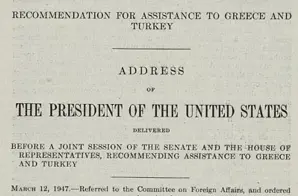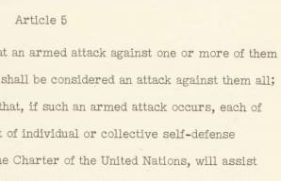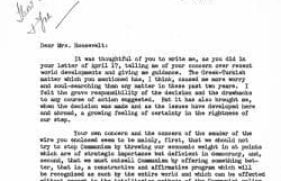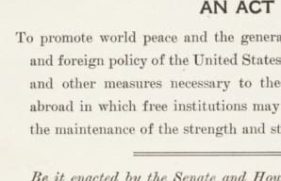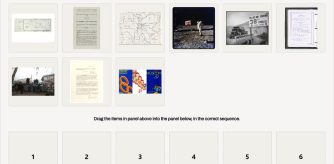This document is President Harry S. Truman’s message to Congress recommending assistance to Greece and Turkey, commonly referred to as the Truman Doctrine.
On March 12, 1947, President Truman presented this address before a joint session of Congress. He asked Congress for $400 million in military and economic assistance for Turkey and Greece.
On Friday, February 21, 1947, the British Embassy had informed the U.S. State Department officials that Great Britain could no longer provide financial aid to the governments of Greece and Turkey. American policymakers had been monitoring Greece’s crumbling economic and political conditions, especially the rise of the Communist-led insurgency known as the National Liberation Front, or the EAM/ELAS. The United States had also been following events in Turkey, where a weak government faced Soviet pressure to share control of the strategic Dardanelle Straits. When Britain announced that it would withdraw aid to Greece and Turkey, the responsibility was passed on to the United States.
In a meeting between Congressmen and State Department officials, Undersecretary of State Dean Acheson articulated what would later become known as the “domino theory.” He stated that more was at stake than Greece and Turkey — for if those two key states should fall, he said, communism would likely spread south to Iran and as far east as India. Acheson concluded that not since the days of Rome and Carthage had such a polarization of power existed. The stunned legislators agreed to endorse the program on the condition that President Truman stress the severity of the crisis in an address to Congress and in a radio broadcast to the American people.
Addressing a joint session of Congress on March 12, 1947, President Harry S. Truman asked for $400 million in military and economic assistance for Greece and Turkey and established a policy, aptly characterized as the Truman Doctrine. This doctrine and the related “domino theory” would guide U.S. foreign policy around the world for the next 40 years. President Truman declared, “It must be the policy of the United States to support free peoples who are resisting attempted subjugation by armed minorities or by outside pressures.” The sanction of aid to Greece and Turkey by a Republican Congress indicated the beginning of a long and enduring bipartisan Cold War foreign policy. Future presidential administrations would use similar reasoning to justify actions in Korea, Cuba, and Vietnam, among others.
The Truman Doctrine is a part of America’s 100 Docs, an initiative of the National Archives Foundation in partnership with More Perfect that invites the American public to vote on 100 notable documents from the holdings of the National Archives. Visit 100docs.vote today.
